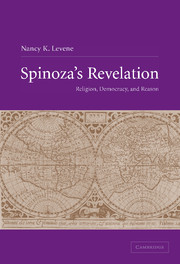Book contents
- Frontmatter
- Contents
- Preface
- Acknowledgments
- List of abbreviations
- Introduction
- 1 Vera religio
- 2 Spinoza's Bible: Concerning how it is that “Scripture, insofar as it contains the word of God, has come down to us uncorrupted”
- 3 Politics, law, and the multitude
- 4 Reason, revelation, and the case of the Hebrews
- Conclusion
- Bibliography
- Index
Introduction
Published online by Cambridge University Press: 22 September 2009
- Frontmatter
- Contents
- Preface
- Acknowledgments
- List of abbreviations
- Introduction
- 1 Vera religio
- 2 Spinoza's Bible: Concerning how it is that “Scripture, insofar as it contains the word of God, has come down to us uncorrupted”
- 3 Politics, law, and the multitude
- 4 Reason, revelation, and the case of the Hebrews
- Conclusion
- Bibliography
- Index
Summary
The focus of this study is Spinoza's revelation, a term that is meant in both its principal senses. In the first place, it refers to what Spinoza incisively reveals, which is the connection of religion, democracy, and reason. What he reveals is that rationality (reason, truth) and religion (morality, piety) depend upon democracy (independence, freedom) – that each depends upon the others, without which “the peace of the commonwealth,” as Spinoza puts it, cannot be secure (TTP, 3). To follow out this connection between philosophy, theology, and politics – reason, religion, and democracy – is to trace the effort in Spinoza to secure this peace. In the second place, revelation – equally covenant, pact, prophecy – refers to the substance of this connection between religion, democracy, and reason, and between the divine and the human as Spinoza understands them. What revelation means in this second sense is literally that which is revealed; that which has an origin, originates, is original; that which comes into existence, creates existence; that which causes itself (causa sui). God, or Nature.
The contrast is with what perpetually endures, what has always been, what will always be.
- Type
- Chapter
- Information
- Spinoza's RevelationReligion, Democracy, and Reason, pp. 1 - 15Publisher: Cambridge University PressPrint publication year: 2004



